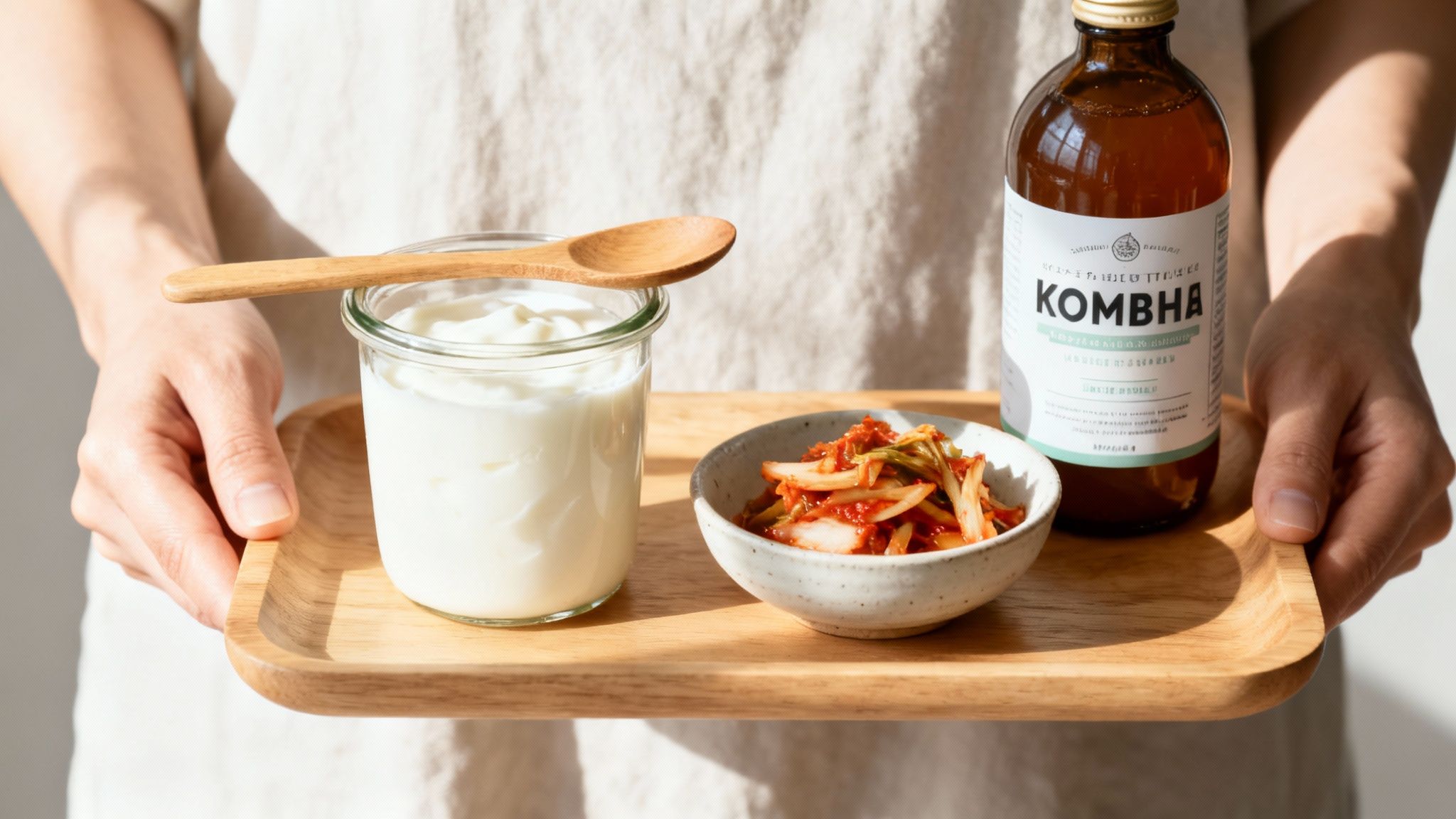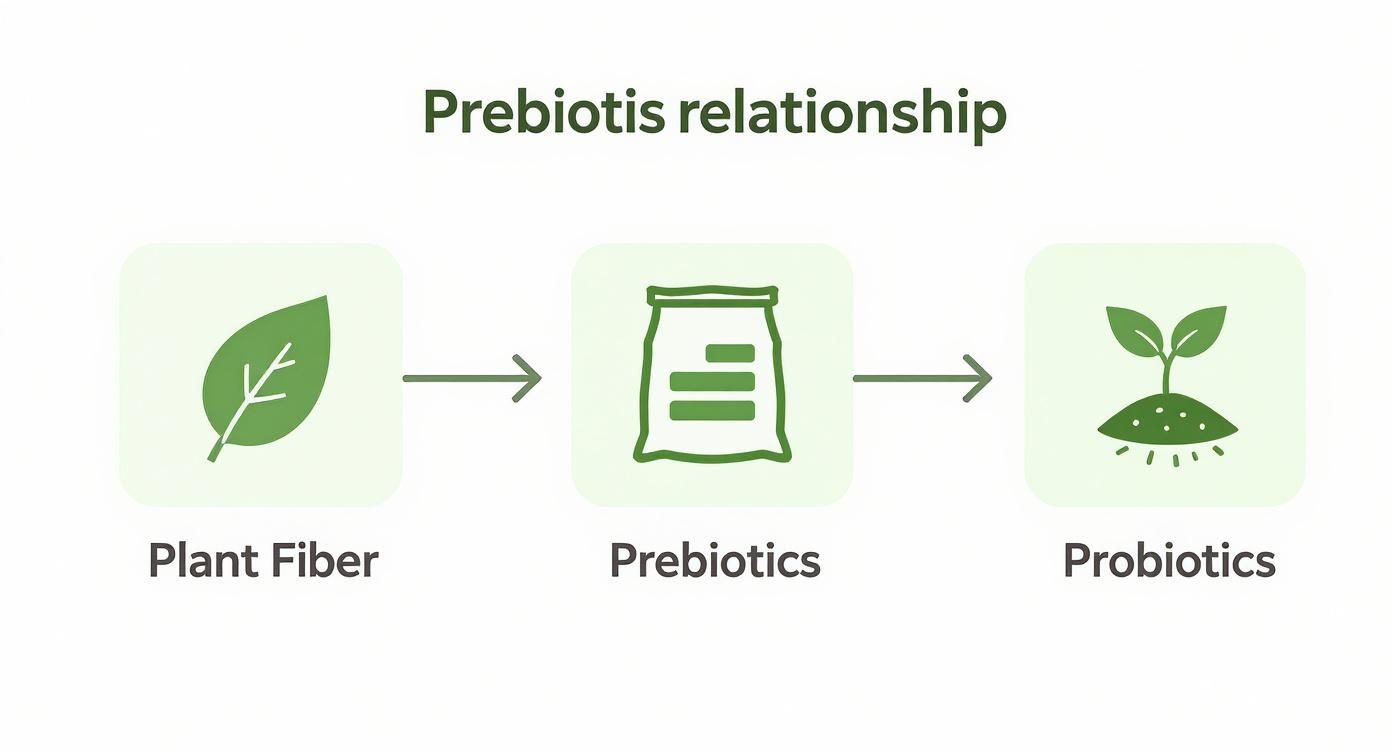Your Guide to Prebiotics and Probiotics for Gut Health
Ever feel like your stomach inflates like a balloon by afternoon? You’re not alone-and it’s not just what you ate. So many of us are all too familiar with that frustrating "ugh" feeling of bloating and gas, and it can seem like you've tried everything under the sun to fix it. But what if the answer isn’t about cutting things out, but about putting the right things back in?

This is your friendly, no-nonsense guide to the powerhouse team of prebiotics and probiotics. We're going to break down exactly what they are and, more importantly, how they work together to bring you digestive comfort and boost your overall well-being. By the time you're done reading, you'll have a clear, easy-to-follow plan for nurturing your gut microbiome and starting to feel your absolute best. Let's get started on the path to a happier gut.
Why Your Gut Deserves Your Attention
Your gut is so much more than just a simple food-processing tube. It’s better to think of it as a bustling inner city-your gut microbiome-home to trillions of microorganisms. When this internal city is balanced and harmonious, everything just works. But when it gets thrown out of whack, you definitely feel it.
We're talking about that annoying gas, unpredictable bathroom trips, and a bloated feeling that just won't quit. Dun, dun, dun-unwelcome gas. Yikes! These aren't just minor inconveniences; they are direct signals from your body telling you something is off. Learning to recognize these signs of an unhealthy gut is the first and most crucial step toward making a lasting change.
Getting a handle on supporting overall digestive health is truly the key. It's all about giving your body the right resources to cultivate a thriving internal ecosystem.
What You'll Learn in This Guide
We're big believers that knowledge is power, especially when it comes to your own health. So, we're going to demystify the science behind gut health without all the confusing jargon.
Here’s a sneak peek at what we'll cover:
- Probiotics Explained: You'll meet the "good guys" that populate your gut and learn why they're so vital for everything from smooth digestion to a strong immune system.
- The Role of Prebiotics: Think of these as the "fertilizer" for your gut. We’ll show you how they help your good bacteria thrive and do their jobs effectively.
- The Synbiotic Power Duo: This is where the magic happens. We'll explore how prebiotics and probiotics team up to create a powerful synergistic effect for long-term gut balance.
- Actionable Steps: We’ll dive into specific foods and simple lifestyle tweaks that support your microbiome, making digestive comfort an achievable, everyday reality.
Meet the Probiotics: Your Gut's Good Guys

Picture your gut as a lush, thriving garden. If that's the case, then probiotics are the friendly gardeners working tirelessly to keep everything in balance. They are live microorganisms-mostly helpful bacteria and a few yeasts-that offer a ton of health benefits when they take up residence in your digestive system.
You've likely heard of them, even if the names sound a bit technical. But don't let that fool you. These tiny powerhouses are absolutely essential for a healthy gut.
The Most Valuable Players on Your Gut's Team
Think of the microorganisms in your gut like a sports team. To win, you need different players with unique skills. Two of the most celebrated and well-studied families are Lactobacillus and Bifidobacterium.
- Lactobacillus strains are the ones you’ll often find in fermented foods like yogurt and kimchi. They're pros at producing lactic acid, which makes the gut environment less welcoming for harmful bacteria. Think of them as your gut's personal security detail.
- Bifidobacterium strains hang out mostly in your large intestine. These are the heavy lifters, breaking down tough fibers and complex carbs your body can’t digest on its own. In the process, they create beneficial compounds that nourish the lining of your gut.
These microbes aren't just freeloading; they're active partners in your health. They play a direct role in digesting food, absorbing nutrients, and even synthesizing crucial vitamins like B12 and K. It’s a pretty amazing internal ecosystem.
When Your Good Guys Go Missing
Unfortunately, modern life can be really hard on our gut's friendly flora. A few common things can knock their populations down, leading to an imbalance called dysbiosis.
This is often the point where you start to notice things like bloating, gas, or just general digestive unease. It's your body's way of signaling that its internal team is outnumbered and needs backup.
Here are a few common culprits that can disrupt your microbiome:
- Antibiotics: While they can be lifesavers, they act like a bomb in your gut garden, taking out the good bacteria right along with the bad.
- High-Sugar Diets: A diet loaded with sugar and processed foods is like junk food for your gut. It feeds the troublemakers, letting them multiply and crowd out the good guys.
- Chronic Stress: It's true-that stressful week at the office can directly impact your gut. Stress hormones can alter the delicate balance and diversity of your microbiome.
- Lack of Sleep: Not getting enough quality rest can also have a surprisingly negative effect on the health and variety of your gut bacteria.
When your probiotic team is depleted, it creates an open invitation for less desirable microbes to move in and cause trouble. That's why actively replenishing these beneficial bacteria is so critical. Choosing the best probiotics for digestion can give your body the targeted support it needs to reinforce its internal team.
Understanding Prebiotics: The Fuel for Your Gut Garden
If you think of probiotics as the new seeds you’re planting in your gut, then prebiotics are the nutrient-rich fertilizer that helps them flourish. It’s a simple concept, but one that’s often missed. Getting this right is a total game-changer for your digestive well-being.
So, what are prebiotics, really? At their core, they are specific types of plant fibers your body can't digest. Instead of breaking down in the stomach like other foods, they make the long journey to your lower digestive tract. Once they arrive, they become the perfect meal for your friendly gut bacteria.
Science Corner: How Prebiotics Work Their Magic
When your beneficial microbes feast on prebiotic fibers, they produce some incredible byproducts called short-chain fatty acids (SCFAs), like butyrate. A 2021 study published in the journal Nutrients highlighted that these SCFAs are gold for your gut. They nourish the cells that line your colon, reduce inflammation, and strengthen the gut barrier. What this means for you: a well-fed gut is a stronger gut, which leads to less bloating and better overall digestion.
Without a steady stream of prebiotic fuel, your probiotic team simply can't perform. That's why taking a probiotic supplement without also thinking about prebiotics is like planting a beautiful garden and then forgetting to water it. You absolutely need both to create a thriving ecosystem.
Where to Find These Gut-Friendly Fibers
The great news is that prebiotic-rich foods are probably already in your kitchen. They're not exotic or hard to find. You can easily pack more of them into your diet with everyday foods like these:
- Garlic and Onions: These flavorful staples are prebiotic powerhouses, perfect for just about any savory dish.
- Bananas (especially slightly green ones): They contain a type of resistant starch that acts as a prebiotic, feeding your beneficial bacteria.
- Asparagus: A fantastic source of inulin, delicious when roasted or tossed into a salad.
- Apples: The pectin fiber in apples is a wonderful prebiotic that supports microbial diversity.
- Chicory Root: You'll often see this in coffee alternatives or fiber bars; it's one of the most concentrated sources of inulin out there.
Many common foods are fantastic prebiotic sources. For those who enjoy a more hands-on approach, cultivating your own garlic is a great way to have a fresh supply right at your fingertips. The goal is to combine a diet rich in these foods with a targeted probiotic for what's known as a synbiotic effect. We'll dive into that dynamic duo next.
The Power Duo: How Probiotics and Prebiotics Team Up
This is where the real magic happens. So far, we’ve looked at probiotics (the seeds) and prebiotics (the fertilizer). On their own, they’re impressive. But when you bring them together, their combined effect is so much more powerful.
This incredible teamwork is what experts call a synbiotic effect. It's the ultimate strategy for cultivating a vibrant, thriving gut garden. When you consistently supply your good gut bacteria with their favorite food, you’re not just helping them survive-you’re empowering them to flourish and transform your gut environment for the better.
This visual shows the simple, powerful relationship: plant fiber provides the prebiotics that fuel your probiotics.

A Founder’s Story: Discovering the Duo
This concept isn't just science; it's personal. Our founder, Sam, knows the frustration of digestive discomfort all too well. For years, he struggled with bloating and that unpredictable "ugh" feeling. It felt like a constant battle.
His breakthrough came when he stopped looking for a single solution and started thinking about the gut as a whole ecosystem. He realized taking probiotics alone just wasn't enough. It was like sending in reinforcements without giving them any supplies. Once Sam began to intentionally combine probiotic-rich sources with prebiotic-dense foods, everything changed.
"I spent years feeling like my own digestive system was working against me. Discovering the partnership between prebiotics and probiotics was the key that unlocked everything. It proved that real, sustainable gut health is achievable, and that's a feeling I wanted everyone to experience." - Sam, Yuve Founder
This experience is at the very heart of why we do what we do. We're not just selling supplements; we're sharing a solution that genuinely transformed a life, built on the simple but powerful principle of gut harmony.
What This Teamwork Means for You
When prebiotics and probiotics work together, the benefits ripple out to affect your whole body. Here’s what this power duo can do for you:
- Smoother Digestion: By fueling the good bacteria, prebiotics help them do their job more effectively. This translates to a better breakdown of food and more regular bowel movements. No more guessing games.
- Less Bloating and Gas: A balanced gut produces less gas. When beneficial microbes thrive, they crowd out the gas-producing troublemakers, leading to a calmer, more comfortable stomach.
- A Stronger Immune System: Did you know that around 70% of your immune system resides in your gut? A healthy microbiome strengthens your gut lining, creating a robust barrier that helps protect you from unwanted pathogens.
- An Uplift in Your Mood: The gut-brain axis is a real and powerful connection. Your gut microbes produce neurotransmitters, like serotonin, that directly influence how you feel. A happy gut truly contributes to a happier you.
Building Your Gut Health Toolkit
Alright, let's turn all this great info into action. Building a gut-friendly toolkit isn't about some massive, restrictive diet overhaul. It's really about making small, consistent choices that add up to big results over time.
Probiotic & Prebiotic Food Checklist
First, let's get those beneficial live cultures (probiotics) and their fuel (prebiotics) onto your plate.
- Yogurt & Kefir: Look for "live and active cultures" for a probiotic boost.
- Sauerkraut & Kimchi: These fermented veggies are gut-health superstars.
- Garlic, Onions, Leeks: Prebiotic all-stars that add flavor to any dish.
- Asparagus, Apples, & Bananas: Easy ways to get prebiotic fiber.
- Oats, Lentils, & Chickpeas: Packed with the fiber your good gut bugs love.
The Real-World Challenge and a Simple Solution
Let's be honest. Even with the best intentions, our busy lives can make it tough to consistently get enough diverse prebiotics and probiotics from food alone. One day you’re on a roll, and the next, it’s takeout. We’ve all been there.
This is exactly where a targeted supplement becomes a core part of a proactive strategy, not just an afterthought. Think of it as your daily insurance policy, ensuring your gut gets the potent, reliable support it needs to stay balanced. Consumer awareness of this is growing fast-the global probiotics market has already shot past USD 100.15 billion. You can read more about these fascinating market trends on Towards Healthcare.
For a delicious and foolproof way to get your daily dose, Yuve Vegan Probiotic Gummies are a game-changer. Each gummy is packed with beneficial bacteria to support your digestive harmony, taking all the guesswork out of the equation. It makes prioritizing your gut health easy and genuinely enjoyable.
Quick Wins: Your Action Plan for a Happier Gut
Feeling fired up but a little overwhelmed? I get it. Let's make this simple. Here’s your personal checklist to kickstart a healthier gut, starting right now.
- Add one prebiotic food to a meal. Slice a banana over your morning oats, add onion to a salad, or grab an apple for a snack.
- Try one fermented food. A spoonful of kimchi, a small glass of kefir, or some high-quality yogurt can introduce a host of beneficial microbes.
- Make your probiotic a daily ritual. To guarantee consistency, make Yuve Vegan Probiotic Gummies part of your morning routine. It’s a delicious, no-fuss way to get daily gut support, even on the most hectic days.
- Hydrate, hydrate, hydrate. Water is essential for helping prebiotic fiber work its magic and keeping your entire digestive system running smoothly.
Every small, positive choice is a win. You are actively building a healthier, more resilient gut one day at a time. This is a journey of nourishment, not restriction. For more ideas, check out our guide on the best supplements for digestive health.
I'd love to hear how it's going! Share your small wins and favorite gut-friendly foods in the comments below. You’ve got this, and we’re here to cheer you on.
FAQ: Your Gut Health Questions Answered
Navigating the world of prebiotics and probiotics can bring up a lot of questions. Let's tackle a few of the most common ones we hear.
Can I Take Prebiotics and Probiotics at the Same Time?
Yes, absolutely! In fact, taking them together is the best way to get the most out of them. The probiotics are the "good bacteria" and the prebiotics are the "fertilizer" that helps them grow. This powerful duo creates a synbiotic effect, making your probiotic far more effective.
How Long Until Probiotics Start Working?
This is the million-dollar question, and the honest answer is: it varies. Some people report feeling a difference-less bloating, smoother digestion-in just a few days. For others, it might take a couple of weeks. The key here is consistency. Sticking with your routine gives your gut the steady support it needs to truly flourish.
If I Eat Healthy, Do I Still Need Supplements?
Eating a fiber-rich, whole-foods diet is the cornerstone of great gut health. But even the best diets can have gaps, and modern life-stress, travel, antibiotics-can throw your microbiome out of whack. A quality supplement is like an insurance policy for your gut. It provides targeted reinforcement to ensure your good bacteria stay resilient, no matter what your week throws at you.
At Yuve, we're all about making gut support easy and enjoyable. Our Yuve Vegan Probiotic Gummies are crafted to give you that reliable, daily boost, making it simple to invest in your long-term digestive wellness.
